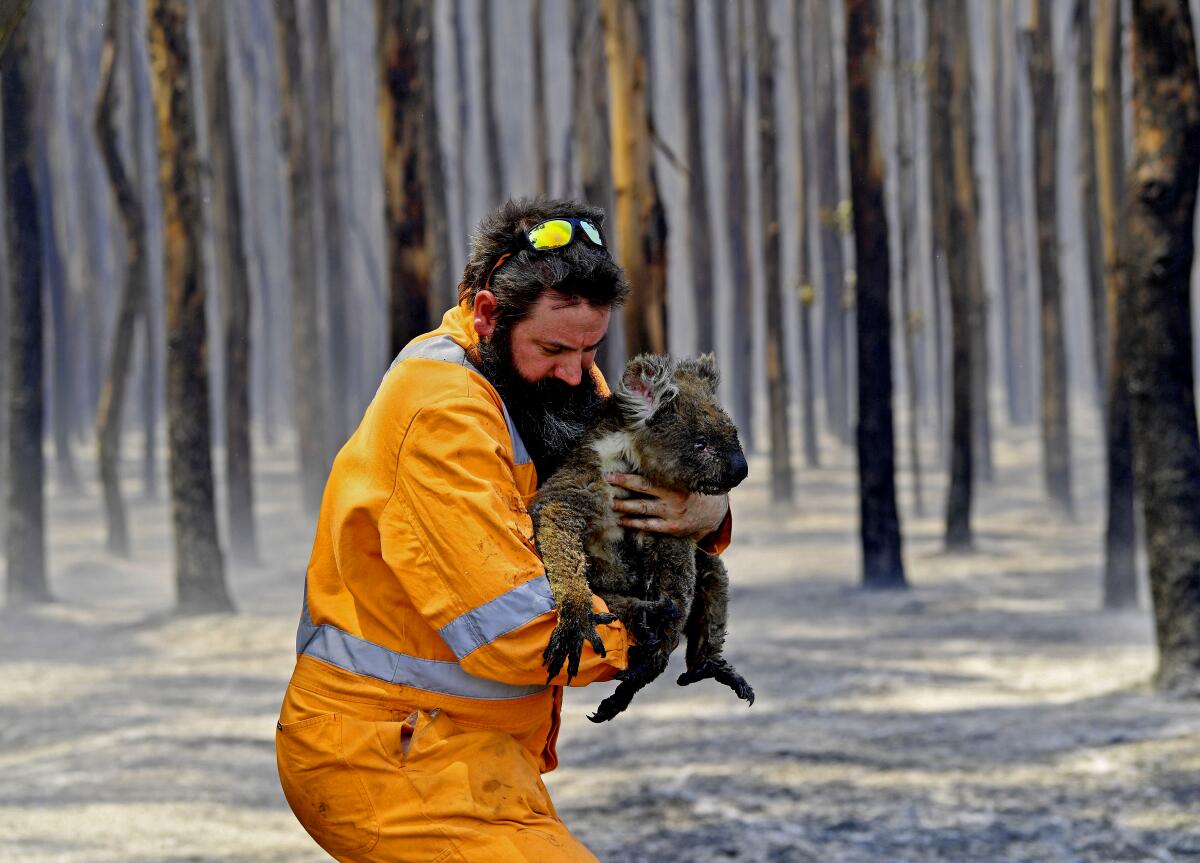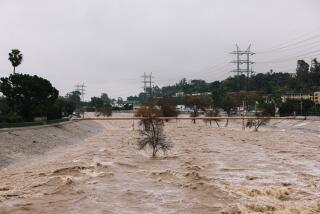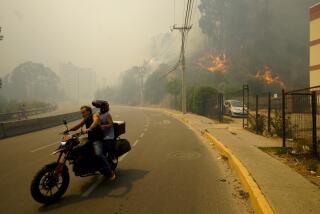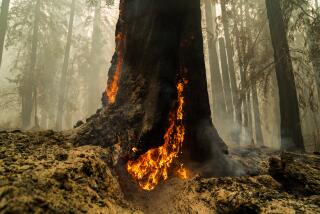Op-Ed: Watching Australia burn from L.A., I felt the devastation of my homeland in my bones
From my family’s farm in Australia, my sister Sally reported blood red rain — a convergence of dust storms, smoke from months of horrendous fires and torrential downpours, followed by golf-ball-sized hail that pelted birds from the trees and fractured windows. The rains had been so severe that an entire country was holding its breath: Would the scorched earth be so drenched that it would turn itself loose, trees and rocks sliding in great swaths of fresh devastation?
The vagaries of bushfires and the wiles of the climate have taken a toll on Sally who manages the 400-acre farm that’s been in our family for three generations. From the homestead that sits on a hill, she watched out over the fields scattered with 100 horses and as many cattle, toward the bush way out the back. Beaten down with worry, there are evenings she fears going to bed for what might happen overnight. If she gets any sleep, she wakes in a sweat from dreams of her horses running blind in flames. Her breathing has been affected by so many weeks of smoky air.
Like most Australians and those observing from afar, Sally has been traumatized by images of koalas trapped in trees or limping through burn areas blistered and starving. How to fathom more than a billion animals killed, the trillions of insects, the news of lesser-known species now closer to extinction — glossy black cockatoos on Kangaroo Island that have been protected for years; the delicate potoroo, akin to a miniature kangaroo, its habitat almost entirely destroyed.
The rains have swilled ash and soot into creeks and rivers, into lakes and the sea. Marine creatures survived the fire only to ingest the water-borne aftermath. The horses have developed coughs from ash-polluted dams and drinking troughs.
”Don’t get me started on the climate-denying government,” Sally said.
I’ve lived in California more than half my life, but each year I make the long haul home. Los Angeles may be my residence, but I’ve written and set novels on that farm, my dreams unfold there. I’m tethered to the Earth by knowing I can always go back, but now I get homesick in a way that surprises me, longing for the familiar flat-voweled accent.

When I phoned Sally, in the worst weeks of the catastrophe, I heard the tremor in her voice: “The sun’s so hot and the winds so strong, it feels like the gum trees are going to self-combust. Then there’s a thunderstorm and the lightning starts more fires. Rain comes down in sheets.”
Something biblical was going on.
Our conversation reminded me of the writing retreat I’d planned for my birthday a decade ago at Mt. Calvary Monastery, in the hills above Santa Barbara. The monastery was fully booked so I ended up with the renegade nuns at nearby Casa de Maria. The evening I settled in, the Tea Fire tore through the hills and I found myself evacuated to the coast, turning 50 alone on a beach. I looked out into the orange-lit night as the historic monastery burned. Ten years later, in 2018, La Casa itself would be buried up to its eaves in rocks and debris when hillsides denuded by the Thomas Fire sent massive trees and boulders roaring down flooded creeks, shattering a community that’s still rebuilding.
On the phone, my sister told me of close friends of ours: The first wave of flames bypassed their house, came back and missed again. Fleeing on the road for eight hours, through smoke and detours, they arrived in Australia’s capital, Canberra, to learn that an ember had landed on the roof of their tool shed. A neighbor who’d stayed behind had fought alone for hours and saved their home.
I’m incredibly moved by the heroism of the locals and the firefighters, the volunteers from overseas, many of them from California, crossing the Pacific to scoop up injured animals and help tend to them. I’m wishing I was there.
Instead, in my office in downtown Los Angeles with its view of the distant ocean, I think of Sally 8,000 miles away. There’s a sense of powerlessness, a beloved countryside altered forever, no longer what I imagined would always be, a place I could return to, safely curl up in. I think about the forest on the farm, how we kept the cattle from grazing there so it could remain a habitat for wallabies, koalas and bandicoots. In our quest to sustain it, the wedding bush and ti-tree groundcover proliferated, like the undergrowth in the mountains and national parks where this summer’s fires raged. The forest survives, but our environmentally conscious instincts might well turn on us.
Indigenous Australians have their own ways of caring for the country. Their traditional methods of controlled burning and reduced fuel loads could still help. And unless our government chooses to listen to the locals and the scientists, the prospects remain dire — annual evacuations and unbearable, uninsurable losses, not to mention an underlying sense of dread taking root in the Australian psyche. I realize now, I come from a dangerous place, even more dangerous than California.
While the shock of that night escaping the Tea Fire in the Santa Barbara hills was profound, as I watched Australia burn from across the hemisphere, I felt the devastation in my marrow. Instead of returning later in the year, I want to leave now, to help my sister load bales from our hay shed and truck them to burned-out farmers who lost their homes but still have stock to feed. A yearning wells from deep in me to somehow protect not just the farm but the country itself, and a way of life that suddenly seems untenable.
I fear the worst is still to come.
David Francis is a lawyer and a writer. His latest novel is “Wedding Bush Road,” set on his family’s farm. He is on the board of trustees of PEN International.
More to Read
A cure for the common opinion
Get thought-provoking perspectives with our weekly newsletter.
You may occasionally receive promotional content from the Los Angeles Times.






